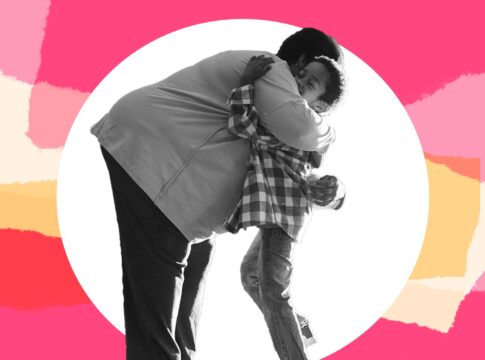This essay was adapted from Phil Christman’s newsletter, the Tourist. Subscribe here.
Once again, we find ourselves talking about undecided voters. Mostly this is because it’s an election year, and the stakes are what they always are when one party in a two-party system does what the GOP is doing. But we’re also talking about undecided voters because the ones that get on our televisions and into our newspapers—not infrequently conservative Trump supporters who are gaming the system, or just people who want to be on TV—are, if you take their expressed opinions at face value, mystifying. This quality is timeless. You saw it in 2016, in 2000, and (if you were alive) in 1988. The undecideds, or at least their media-appointed representatives, have always been mystifying.
Many commentators have suggested that undecided voters’ opinions are better understood not as deeply held, thought-through beliefs, but as a sort of verbal Muzak. You say, of a candidate who has given many policy specifics already (and whose opponent speaks in word salad), “I need more policy specifics,” because it sounds better than “I don’t know what policies I want.” You say “The candidates just attack each other” because it sounds better than “I don’t actually know what the candidates are attacking each other about.” You say “I just need to hear more,” 16 months into an election cycle, because it sounds better than saying “I wasn’t listening.” This is natural enough. I don’t really believe that there’s such a thing as being “apolitical”—how we live among others is our politics, and it may be incoherent or unarticulated, but it’s always there. But what we’re asking uncommitted voters for is not “politics,” exactly, but something more like “recent national party-politics news knowledge” or “policy opinions.” You can’t really know these things unless you like doing homework and have a statistically abnormal amount of time for it. Most people have jobs to do, a mounting sleep debt, and painful memories of school; the deep political agnosticism and lack of detailed knowledge of current events that results from these conditions isn’t surprising, nor is it evidence of bad character or defective intelligence. But it’s also hard to cop to when a camera is pointed at you.
I think about undecided voters and their mysterious utterances a lot, because I teach freshman English at a university, and am therefore a regular recipient of the sorts of phrases that people say when they have to say something. I very literally invite such responses. My students are stressed and overwhelmed human beings with limited time, and they live in a society with a deeply ambivalent attitude toward education as such. So, just as often as they say things that make me proud or bring me up short, they say things to cover up for not having anything to say. They say things like: “The author is too flowery”; “The author doesn’t get to the point”; “The author is repetitive.” All of these can be true of various pieces of writing, but the problem is that the first comment will be about, say, Ernest Hemingway, the second comment will be about an analytic philosopher who states the argument in words of one syllable on the first page, and the third comment will be about an Oulipo story where the single constraint is that you never use the same letter twice. The comments will often seem like phrases recurring completely at random.
Early in my teaching career I was confused by this. I finally realized that students’ comments are sometimes just the student’s equivalent of “I’d like more policy specifics.” When I figured this out, I had a different problem to solve. I had to figure out how to basically filter out the signal from the noise, without seeming harsh or dismissive. In class discussion, it’s best to build on observations students make. But since students are often slow to challenge each other, a fundamentally untrue or laughably unobservant statement that gets thrown into a discussion without being challenged tends to just sit there, distorting the whole discussion. (This is also true of our national discussion, to painful effect.) So I had to figure out how to lead students past these sorts of anti-observations—or rather, I have to figure that out every day, newly, in every situation. One thing I do is to talk early and often about the difference between reacting and sitting with. I ask students to describe why someone might find a piece of writing difficult, without using any pejorative language. I have them spend a few minutes looking for ways that the style either seems consonant with the message or at odds with it, and we then discuss their reflections on that. Reacting is different than thinking, and I have to continually monitor the wording of my own questions to students for the ways I’m inviting reactions rather than thoughts.
In all sorts of domains, we make a fetish of asking for and responding to “feedback,” and we tell ourselves that this practice represents a kind of democratic openness. The obsession with focus groups and undecided-voter sound bites is one facet of this practice. We want feedback so badly that we don’t always worry about the difference between a reaction and a thought. This may seem innocent enough, but when we take other people’s presentation of a reflexive anti-intellectualism at face value, we can trap ourselves in a cycle of perpetual dumbing down. Is “democracy” what happens when you create a system that is responsive to people’s unexplored, knee-jerk reactions, to the clichés they grab out of the handiest mental drawer to cover a near-total failure of attention? Or is democracy what happens when you give people the chance to actually think?
The previous paragraph probably sounds mean enough—“clichés” from a “mental drawer”; “knee-jerk reactions”; “failure of attention.” But these are universal faults, not the faults of some imaginary unwashed who live out there somewhere. Those of us who love doing homework can be just as guilty of them; the only difference is that we can also be far more arrogant about it. A credential is an epistemological shortcut that functions in the same way that a received belief—a cliché belief—does. I don’t have time to assess a stranger’s professional ability, so I look at the piece of paper on their wall. It’s a token of a substance we don’t have time to examine for ourselves. We can’t help doing this kind of thing sometimes; there’s too much to process. But the doctor you can actually trust is the one who is too busy thinking about medicine, about new studies of new treatments and their limitations, about human bodies and what keeps them alive, to ever remember that damn credential, no matter how much real effort they put into getting it. Every intellectually serious person gets up every day determined to fight their own stupidity. Every intellectually serious person is someone who remembers all the times they lost. The credential is a piece of paper to them, even if they’ll defend it (for the sake of the profession, of their co-workers, of their customers, of labor solidarity) against bad-faith attacks from outside.
Recently there’s been a conversation among college teachers about how much more self-stupefying we’re willing to do. Basically, students are expressing a reluctance to read that seems unprecedented to many educators. Some teachers are trying to figure out how to do our jobs, which definitely involve “getting people to read and then talk about what they read,” in this environment. Some others are taking these students’ expressed fear of reading, and their contempt for it, at face value, and saying: Fine. We can’t assign books anymore. We’ll just read “chunks.”
To some extent, you always have to start where your students actually are. (One way I do this is to mostly assign short but intense/demanding readings, plus one full book later in the semester. I also front-load my hardest readings in the first week of the semester—before Calc has really started to exact its toll.) But if you’re charging people college tuition and you aren’t making them read long, involved things, you are ripping them off, by definition. If reading is “over,” a college humanities teacher’s job is to stubbornly resist this reality and to force it to change, not to accommodate it.
But I don’t think it is a reality—at least not the only one. The other day I discussed Guy Davenport’s “On Reading” with my students. It’s part of a little unit I do where we read a variety of reading-and-writing autobiographies by writers of various stripes—the only thing they all have in common is that I think their shit is good—and try to see what they do, so that the students can then mine their own reading-and-writing experiences for a similar sort of essay, one that sits somewhere between “personal” and “argumentative/academic.” It’s a bridge to purer academic writing, or at least I hope it is.
Anyway, as part of our discussion of this piece, some students zeroed in on Davenport’s claim that reading is, basically, uniquely essential to a civilization, because it encourages certain kinds of thinking that other media don’t. So I brought up the recent “is reading over” discussion, and they were horrified and insulted by the implication that Gen Z can’t be challenged. If you asked any of these students, on a given Monday morning, “Would you like it if Mr. Christman cut all his readings from the syllabus and lowered his standards for grading,” they would mostly say yes, because that’s the response that a tired person gives to the news that their workload may reduce. But, equally, if given a chance to reflect a bit, they know that that’s not an education. Nor is an obsession with the sound bites generated by undecided voters the same thing as a full democracy.




